The Iliad (Penguin Classics) Read online
Page 37
1–261: The Trojans retreat in panic from the Greek camp. ZEUS wakes up, furious, and turns on HERA, who claims innocence. ZEUS foretells the deaths of Patroclus and Hector, calls off P O S EI -DON (who reluctantly obeys) and orders APOLLO to revive Hector and restore the Trojans’ victorious assault.
262–389: Hector returns invigorated to battle. The Greeks panic and run. APOLLO kicks down the Greek defences, and the Trojans swarm round the ships.
390–405: Patroclus, hearing the noise, leaves the wounded Eurypylus and returns to Achilles.
405–564: Hector and Ajax rally their own sides: general fighting.
565–746: ZEUS spurs on Hector, and the Greeks retreat further back among their ships. Ajax defends the ships with a huge pike, but slowly has to yield.
The fleeing Trojans re-crossed the stakes and ditch, many falling at the hands of the Greeks, and did not stop till they reached their chariots. As they paused there, panic-stricken and pale with terror, Zeus, who was still lying on the heights of Mount Ida beside Hera of the golden throne, awoke and leaping to his feet took in the situation – the Trojans thrown back and the Greeks in hot pursuit; lord Poseidon helping in the chase; and Hector lying on the ground with his comrades sitting round him.
(10) Hector was breathing in some discomfort and coughing up blood. He was still dazed, since the man who had hit him was by no means the feeblest in the Greek ranks. The Father of men and gods was filled with pity at the sight of him. He gave Hera a terrifying black look and spoke his mind:
ZEUS accuses HERA of deception
‘Hera, you are incorrigible. It is through your treacherous tricks that godlike Hector has been stopped from the fighting and the Trojans routed. I have half a mind to give you a good thrashing and let you be the first to enjoy the consequences of your wretched antics again. Have you forgotten the time when I strung you up with a couple of anvils hanging from your feet and your hands (20) lashed together with a golden chain you could not break? There you dangled, up in the air and in among the clouds; and the gods on high Olympus, though they stood around you in despair, found it impossible to set you free. I seized anyone I caught in the attempt; I hurled him from my threshold and, when he reached the ground, the breath was knocked right out of him.
‘But even that did not relieve the heartache I felt for godlike Heracles when you, after persuading the gales to help you in your evil schemes, had sent him scudding over the murmuring sea before a northerly gale. You swept him off in the end to the prosperous island of Cos. But I rescued him from Cos and (30) brought him back to Thessaly where the horses graze, after all he’d been through.
‘I am reminding you of this to put a stop to your deceptions and to teach you how little good has come of that love-making of yours, which you tricked me into when you came here from Olympus.’
So he spoke, and ox-eyed lady Hera shuddered and spoke winged words:
‘Now let my witnesses be Earth, and the broad skies above, and the falling waters of Styx – the greatest and most solemn oath the blessed gods can take – and your sacred head, and our (40) own bridal couch, by which I would never dare to perjure myself: it is not my fault that Poseidon the earthshaker is doing Hector and the Trojans harm and helping the Greeks. I can only suppose he was sorry for the Greeks when he saw them hard-pressed beside the ships and felt it necessary to take action. Indeed, I would be quite ready to advise him to go wherever you told him to, Zeus who darkens the clouds.’
So she spoke, and the Father of men and gods smiled and, replying, spoke winged words:
ZEUS foretells Achilles’ return (15.596)
(50) ’Ox-eyed lady Hera, if from now on I could count on you to support me in the council of the gods, Poseidon would soon come round and see eye to eye with you and me, however much he might be otherwise inclined. However, if you have told me the full, exact truth, go back now to the gods and order Iris and Apollo the renowned Archer-god to come here. I want Iris to visit the bronze-armoured Greeks and tell lord Poseidon to stop fighting and go home; and Phoebus Apollo to bring Hector back (60) into the battle after breathing new energy into him and making him forget the pain that is causing him such distress.
‘Phoebus must then sow panic among the Greeks and make them run for it. They will fall back as far as the many-benched ships of Achilles son of Peleus, who will send his companion Patroclus into the fight. Patroclus, after killing a number of his brave enemies, including my own son godlike Sarpedon, will fall to the spear of glorious Hector in front of Ilium; and godlike Achilles, infuriated at Patroclus’ death, will kill Hector himself. (70) From that moment on, I will arrange a steady Greek counter- attack from the ships till the day when the Greeks capture steep Ilium, helped by Athene’s advice.
‘But in the meantime I remain hostile to the Greeks and will not permit any other of the immortals to come down to their assistance until the wishes of Achilles are fulfilled, in accordance with the promise I gave him (and confirmed with a nod of my head) that day when the goddess Thetis put her arms round my knees and supplicated me to give honour to her son Achilles, sacker of cities.’
So he spoke, and the goddess white-armed Hera complied (80) and set out from Mount Ida for high Olympus. Like the speed of thought of a man who has travelled widely and in his sharp mind thinks ‘I wish I were there, or there’, and instantly brings it all to mind, so quickly the eager lady Hera flew.
On reaching the peak of Olympus, she presented herself to the immortal gods who were assembled in the palace of Zeus. When they saw her, they all leapt to their feet and drank her health. Ignoring the rest, Hera accepted a cup from fair-cheeked Themis, who was the first to come running up to her and speak to her with winged words:
(90) ’Hera, what brings you here? You look flustered. You must be beating a hasty retreat from your husband, the son of Cronus!’
The goddess white-armed Hera replied:
‘Divine Themis, no questions about that. You know yourself how arrogant and uncompromising he can be. But if you will give a lead by beginning the gods’ feast in the palace, you and the rest shall hear all about the wicked schemes Zeus is contemplating. And in case anyone is sitting happily down to feast, I can assure them that the news will not please everybody, man or god.’
(100) With these words the lady Hera took her seat, and up and down the hall of Zeus the gods were filled with consternation, for though there was laughter on Hera’s lips, there was no warmth in her forehead or dark brows. Angrily she addressed the company:
HERA warns of ZEUS’will
‘What fools we have been! What idiots, to quarrel with Zeus! Yet here we are, still determined to have a go at stopping him, if not by talking, then by force. And all the while he simply sits there, by himself, showing not the slightest interest. He could not care less about us. He knows that, for sheer brute force, he is without question first among the gods. As a result, you all have to take whatever troubles he may send you lying down! For example, if I am not mistaken, a (110) calamity has already overtaken Ares. A son and favourite of his, Ascalaphus, has fallen in action. Imperious Ares does claim to be his father, does he not?’
So she spoke, and Ares slapped his sturdy thighs with the flat of his hands and in anguish said:
‘Gods who live on Olympus, don’t get angry with me now if I go down to the Greek ships and avenge the slaughter of my son, even if it is my destiny to be struck down by Zeus’ thunderbolt and join the bodies in the blood and dust.’
So he spoke and called to his sons Panic and Rout to yoke his (120) horses, while he himself put on his glittering armour.
ATHENEprevents ARES’ revenge (13.519)
And now another quarrel, even greater and more disastrous than the last, would have broken out between Zeus and the immortals, if Athene in her terror for the whole divine community had not leapt from her chair and dashed out after Ares through the porch. She snatched the helmet from his head, the shield from his shoulders and put away the bronze spear she took from his sturdy han
d. She then gave the wild War-god a piece of her mind:
‘You maniac! You idiot! You’re done for. You clearly don’t (130) have ears to hear with. Reason, restraint – all gone. Did you not hear what we were told by Hera, who has come straight from Olympian Zeus? Or do you really wish to get a thrashing for yourself and to be chased back to Olympus with your tail between your legs, while the rest of us reap the whirlwind you’ve sown? I tell you, Zeus will leave those proud Trojans and Greeks without a moment’s thought, come straight here to Olympus and cause absolute mayhem, seizing each of us in turn, innocent and guilty alike. Take my advice, then, and forget your anger for your son. Many a finer and stronger man than he has been (140) killed before now and will be killed in the future. It would be very difficult to protect the family and children of every man on earth.’
With these words Athene led the wild War-god back to his chair. Hera then called Apollo and Iris, who is messenger of the immortal gods, out of the palace and spoke winged words:
‘Zeus requires you two to go with all speed to Mount Ida. When you have reached the palace and appeared before him, you will carry out whatever orders he gives you.’
With these words the lady Hera went back in again and sat (150) down on her throne, and the pair flew off at speed. When they reached Mount Ida of the many springs, mother of sheep, they found far-thundering son of Cronus sitting on the summit of Gargarus, enveloped in a perfumed mist. They came and stood before Zeus who marshals the clouds. He had no fault to find with them, since they had carried out his wife’s instructions promptly. He first spoke to Iris with winged words:
‘Off with you, swift Iris. Inform lord Poseidon of everything (160) (POSEIDON told not to help the Greeks) I say and tell him no lies. Instruct him to stop fighting, retire from the battlefield and either rejoin the company of the gods or withdraw into his own bright sea. If he chooses to ignore my explicit commands, let him think carefully about it and consider whether, powerful though he is, he would be able to resist an attack from me, who is by far the stronger god and his senior by birth. Not that he hesitates on that account to behave as my equal, even though the other gods all live in terror of me.’
So he spoke, and swift Iris, quick as the wind, complied and (170) set out from Mount Ida for sacred Ilium. Like snow or chilling hail that falls from the clouds at the onset of a bitter north wind, so quickly the eager Iris flew. She went straight up to the famous earthshaker and said:‘Sable-haired god, you who encircle the world, I have come here with a message from Zeus who drives the storm-cloud. He orders you to stop fighting, retire from the battlefield and either rejoin the company of the gods or withdraw into your own bright sea. If you choose to ignore his explicit commands, he (180) threatens to come here and take you on in person. He instructs you not to engage in combat with him, since he is by far the stronger god and your senior by birth. Not that you hesitate on that account to behave as his equal, even though the other gods all live in terror of him.’
Indignant, the famous earthshaker replied:
‘This is outrageous! Zeus may be powerful but it is sheer arrogance for him to talk of forcing me, his equal in prestige, to bend my will to his. There are three of us brothers, all sons of Cronus and Rhea: Zeus, myself and Hades, the lord of the dead. Each of us was given his own domain when the world was (190) divided into three parts. We cast lots, and I received the grey sea as my inalienable realm, Hades drew the darkness below and Zeus was allotted the broad sky in the upper air among the clouds. But the earth was left common to all of us, and high Olympus too.
‘So I am not going to live at Zeus’ beck and call. Powerful though he is, let him stay quietly in his own third of the world. And don’t let him try to scare me with threats of violence, as if I were some out-and-out coward. He’d do better to issue his nasty threats to his own sons and daughters. He is their Father, and they are duty bound to listen when he orders them about.’
(200) Swift Iris, quick as the wind, replied:
POSEIDON reluctantly agrees to desist
‘Sable-haired god, you who encircle the world, do you really wish me to convey this blunt and uncompromising reply back to Zeus? Won’t you change your mind a little? It is the mark of a noble mind to be swayed. And you know how the avenging Furies always support elder brothers.’
Poseidon the earthshaker said:
‘Goddess Iris, all that is very true. It is noble, too, for a (210) messenger to show such tact. But it really hurts to be insulted and bullied by a god with whom destiny has decreed that I should share the world on equal terms. However, I will give in now, though not without resentment. But I will tell you something else, and this is a serious word of warning. If Zeus, against my wishes and those of the war-leader Athene, Hera, Hermes and lord Hephaestus, spares high Ilium and will not have it sacked, giving the Greeks a resounding victory, let him know there will be an irreparable breach between the two of us.’
With these words the earthshaker left the Greek army and withdrew into the sea. The Greek warriors missed him badly.
(220) Then Zeus who marshals the clouds addressed Apollo:
APOLLO told to restore Hector (14.412)
‘Go now, dear Phoebus, to bronze-armoured Hector. The earthshaker who encircles the world has by now retired into the bright sea to avoid the full weight of my anger. Indeed, if we had come to blows, everyone would have heard of it, even the gods who live with Cronus in the world below. But it was a far better thing for both of us that, resentful though he was, he should have yielded to me without taking me on – otherwise there would certainly have been much sweat before matters could have been settled.
‘Now take my fringed aegis in your hands, give it a fierce
(230) shake and strike panic into the Greek warriors. And make glorious Hector your special concern, Archer-god. Fill him with tremendous energy until such time as the Greeks reach their ships and the Hellespont in panic. At that point, I myself will decide what must be said and done to give them a breathing-space from battle.’
So he spoke, and Apollo turned no deaf ear to his father’s words but swooped down from the mountains of Ida with the speed of a dove-destroying hawk, which is the fastest thing on wings. Godlike Hector, son of wise Priam, was no longer (240) prostrate when he found him, but sitting up. He had just regained consciousness and could recognize the friends about him, having ceased to pant and sweat from the moment when Zeus who drives the storm-cloud had willed his recovery. The Archer-god Apollo came up to him and said:
‘Hector son of Priam, why are you sitting here away from your troops and in such a sad state? Have you been hurt?’
In a feeble voice Hector of the flashing helmet replied:
‘What god are you, my lord, and why do you come to me for news? Don’t you know that, as I was killing Greeks by the outer line of ships, Ajax, master of the battle-cry, hit me on the chest (250) with a lump of rock and knocked all the fight out of me? Indeed, I thought I was going to breathe my last today and descend among the dead in Hades’ halls.’
Lord Apollo the Archer-god replied:
‘Take heart! Trust the ally that Zeus son of Cronus sends you from Mount Ida to take his place beside you and protect you -myself, Phoebus Apollo of the golden sword, who in days gone by have saved not only you but your lofty citadel as well. Up, now! Command your many charioteers to drive at the gallop (260) right up to the hollow ships, and I will go ahead of them, making a way over the ditch for the horses and putting the Greek warriors to flight.’
With these words he breathed tremendous energy into this shepherd of the people. As a stabled horse breaks his halter at the manger where he feeds and, hooves thudding, gallops off across the fields to his usual bathing-place in the sweet-flowing river, exultant; he tosses his head; his mane streams in the wind
along his shoulders; he knows how beautiful he is, and his feet carry him skimming over the ground to the horses’ haunts and (270) pastures – so Hector lightly and easily now sprinted off when he heard the god
speak, urging on his charioteers.
The Greeks were like rustics with a pack of hounds chasing an antlered stag or wild goat. It takes refuge in some well-shaded wood or steep rocky outcrop: it was not, after all, destined to be caught by them. Then suddenly a bearded lion, roused by their cries, appears in their path and, for all their determination, sends them running – so the Greeks had been advancing steadily in mass formation, stabbing with their swords and curved spears. But when they saw Hector once more marshalling his (280) men, they were filled with consternation, and their hearts sank.
Thoas, Andraemon’s son, then addressed the Greeks. He was by far the finest of the Aetolians, skilled with the spear and a good man in a standing fight. Moreover, there were few Greeks who could get the better of him in the assembly when they competed to give the best advice. He had their interests at heart as he rose and addressed them:
Thoas prepares the Greeks to face Hector
’Well, well, what a miracle – Hector risen from the dead! Just when we were all thinking that Ajax son of Telamon had (290) finished him off, some god has taken him in hand and brought him back to life, as though he hadn’t killed enough of us already. And there is more of that to come. Hector would not be back in the front line threatening us like this, if loud-thundering Zeus had not put him there.
‘So I suggest we all do what I now propose. Let the main body retreat to the ships, while we that claim to be the best men in the army make a stand, with our spears up at the ready, in the hope of holding Hector’s first attack. For all his determination, I have an idea he’ll think twice about engaging with such a Greek force.’
(300) So he spoke, and they heard and agreed. They gathered in their best men to form a closed battle-line against Hector and his Trojans, under the leadership of Ajax, lord Idomeneus, Teucer, Meriones and Meges. Behind them, the main force retreated to the Greek ships.

 The Odyssey
The Odyssey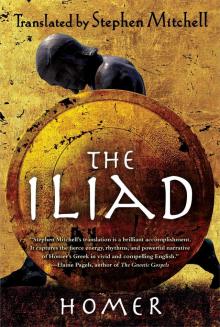 The Iliad
The Iliad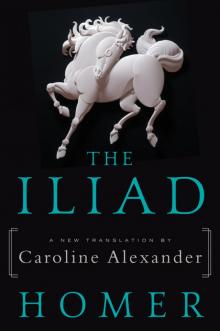 The Iliad (Trans. Caroline Alexander)
The Iliad (Trans. Caroline Alexander)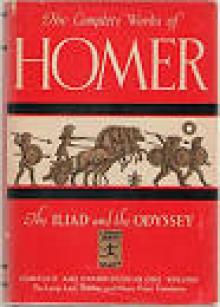 Complete Works of Homer
Complete Works of Homer The <I>Odyssey</I>
The <I>Odyssey</I>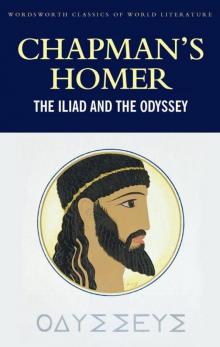 The Iliad and the Odyssey (Classics of World Literature)
The Iliad and the Odyssey (Classics of World Literature)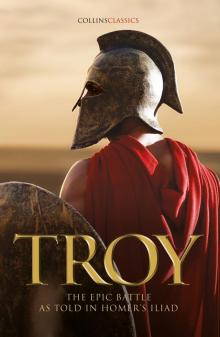 Troy
Troy The Iliad (Penguin Classics)
The Iliad (Penguin Classics) Delphi Poetry Anthology: The World's Greatest Poems (Delphi Poets Series Book 50)
Delphi Poetry Anthology: The World's Greatest Poems (Delphi Poets Series Book 50)